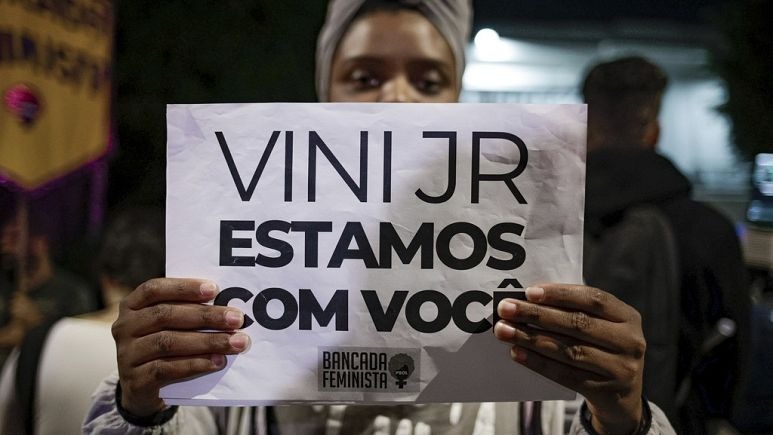Former professionals from the English Premier League share their experiences and tell us what can be done about racism.
Racism is a curse that haunts football worldwide. For years there have been attempts to banish it from the “most beautiful sport”, but like an ugly stand-up guy it still makes its uninvited appearance in stadiums time and again.
The most recent example is the attacks on Brazilian star striker Vinicius Junior, who plays for Spanish record champions Real Madrid.
But no country seems immune.
Former English Premier League players recall their experiences. First, former Manchester City defender Nedum Onuoha:
“Racism doesn’t happen often, but every time it happens it knocks you back and knocks you down. Just when you think everything is fine, you are reminded that it’s not. It’s a reminder of how some people actually see you. It’s not like everyone is, but even if it’s just one per cent, with the amount of people involved in football, one per cent is a lot.”
Mark Bright played for Leicester City and Chrystal Palace, among others, where he formed a legendary strike force with Ian Wright:
“In hindsight, the broadcasters let us down, radio let us down, the Professional Footballers’ Association let us down, actually. They didn’t fight it. They just told us to bury our heads in the sand and it will go away. But it didn’t go away. The players and the fans had to get organised to get everything going, to get the Kick Racism Out of Football campaign going and get people on board. Five thousand people behind the goal chanting ‘black this’ and ‘black that’. It’s difficult to play in front of a crowd like that. In those days you had to be tough, you had to be resilient.”
But what to do? In the case of Vinicius Junior, the Spanish Football Federation has handed down its harshest punishment yet.
But the players themselves also have a role to play, according to the first black player at London’s traditional club Chelsea, Paul Canoville:
“Nowadays, players like me, young black players, should not be quiet. They should say something on the spot. Back then I didn’t do that. That’s something I teach the young players now.”
Football needs outside help in tackling racism, however, and is getting it from anti-discrimination campaigns such as Kick It Out in the UK and LICRA in France.
The Fare network, a pan-European group fighting discrimination in football, places undercover observers in the stands at the biggest matches to spot racist chants and extremist symbols on banners.
In Spain, the hate campaign against Vinicius Junior has led to a nationwide solidarity movement.
And in Germany, too, there are more and more fan initiatives against racism in football.
Even if racism is unlikely to be eradicated in the foreseeable future in the age of social media, the attempt to ban it from football stadiums seems worth the effort.
